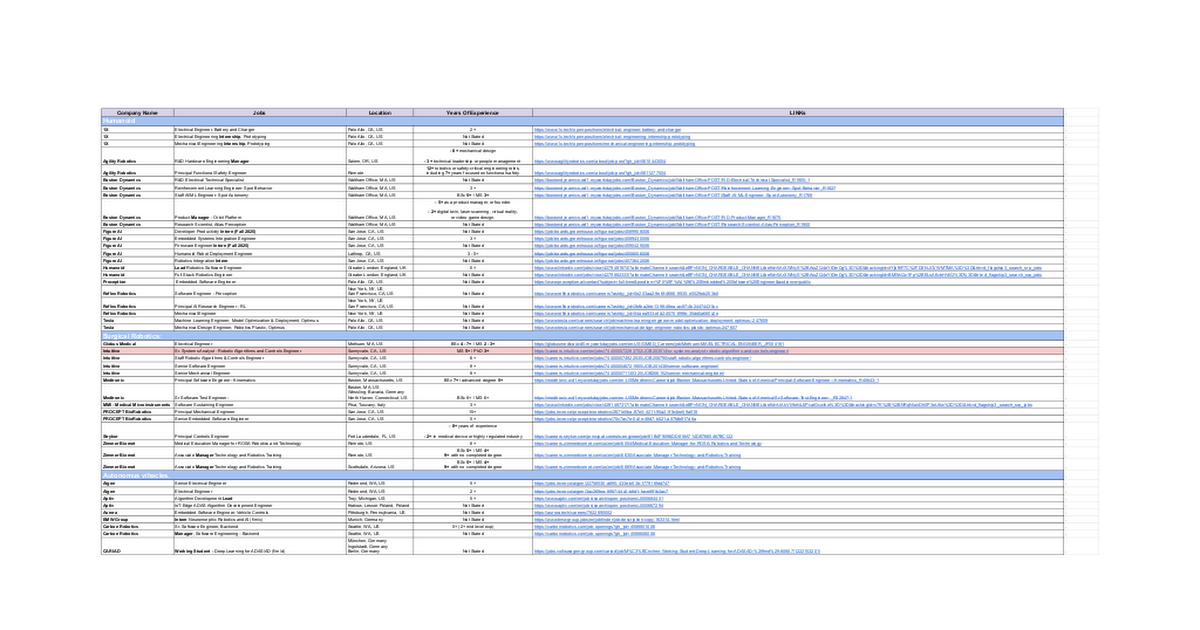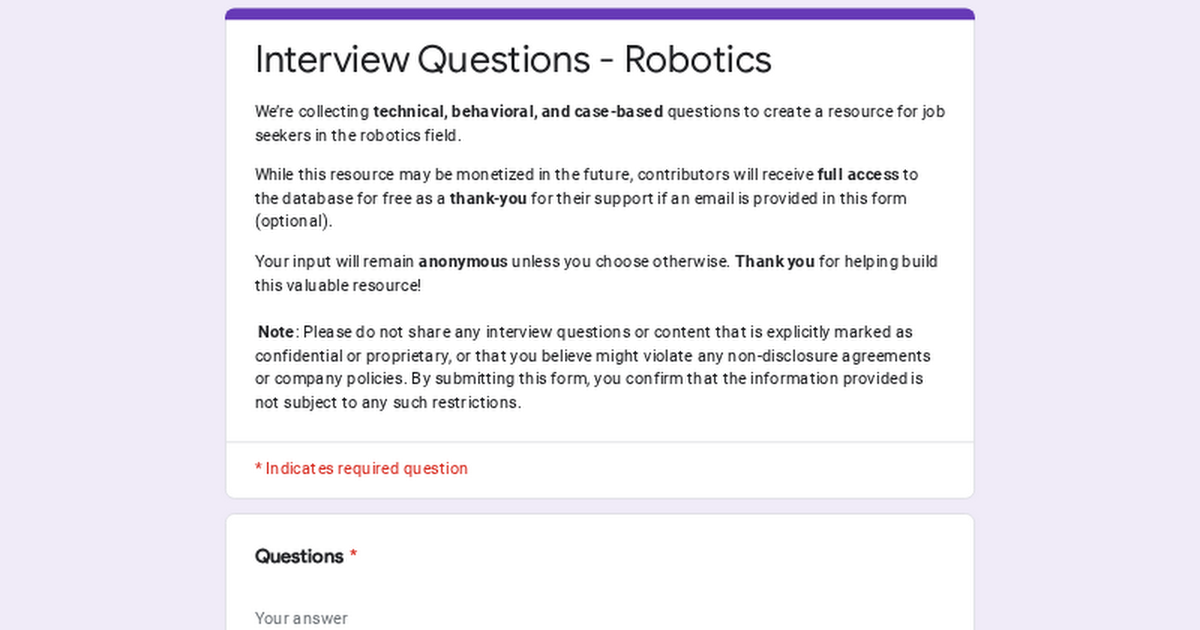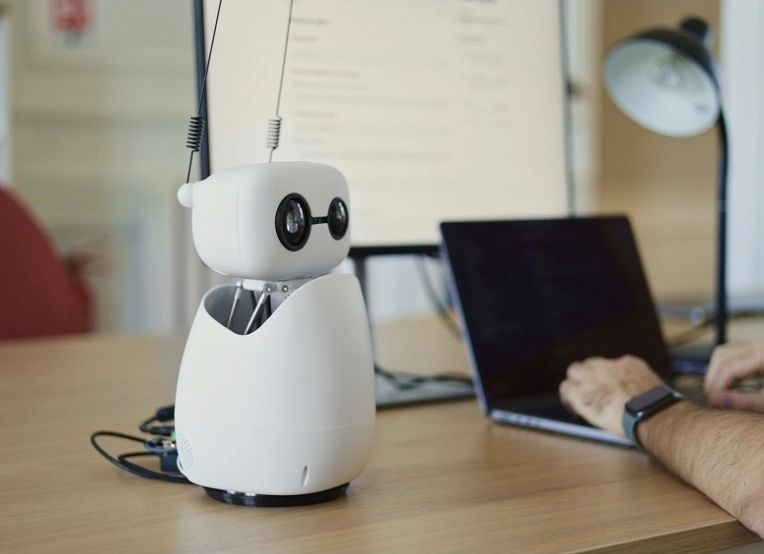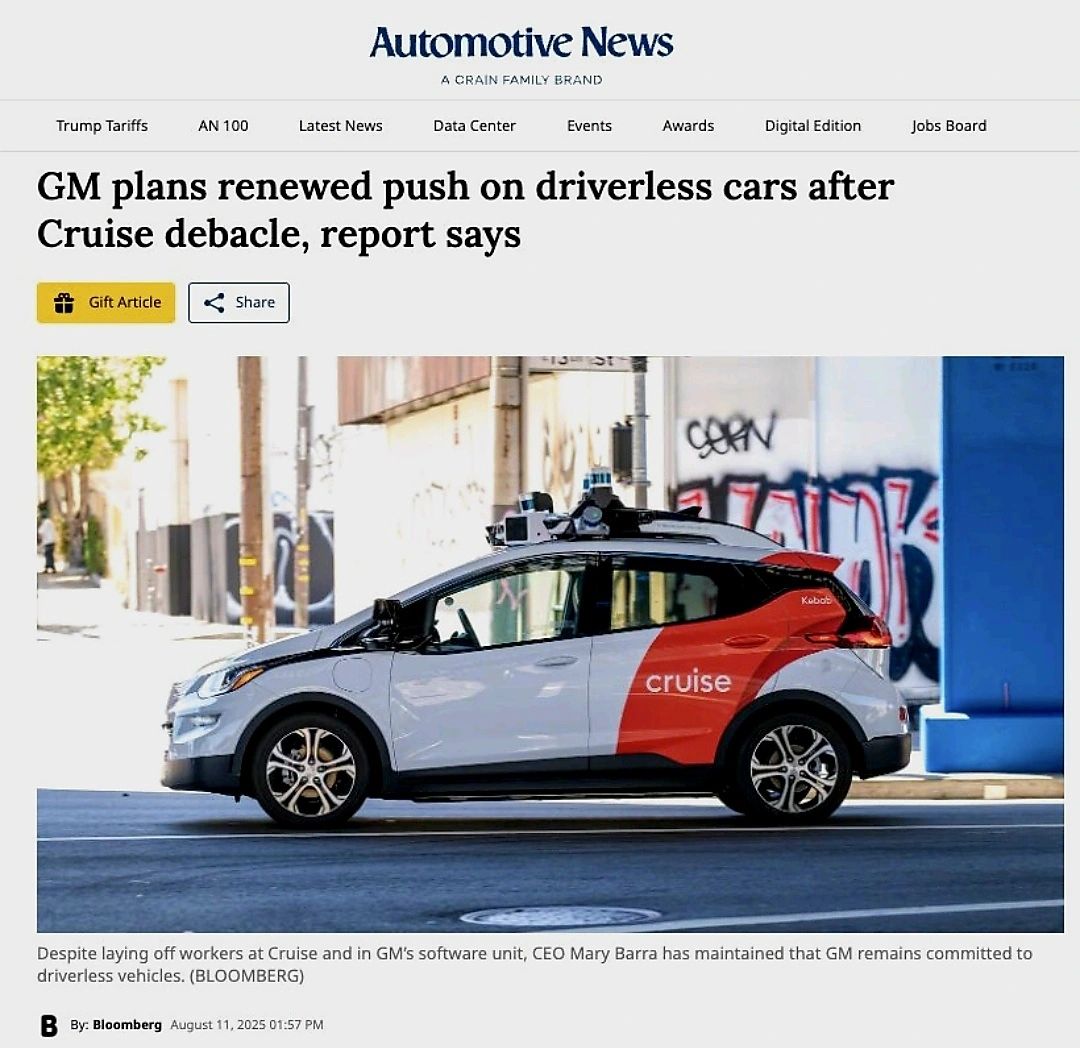Week 2 Aug - Robotix

1- Here are the Robotics Engineering Jobs for the 2nd week of Aug.
Aug 2025 - Weekly Robotix Jobs

2- Share the questions you were asked during your interview to help us build a database of robotics interview questions
Interview Questions - Robotics
We’re collecting technical, behavioral, and case-based questions to create a resource for job seekers in the robotics field. While this resource may be monetized in the future, contributors will receive full access to the database for free as a thank-you for their support if an email is provided in this form (optional).
Your input will remain anonymous unless you choose otherwise. Thank you for helping build this valuable resource! Note: Please do not share any interview questions or content that is explicitly marked as confidential or proprietary, or that you believe might violate any non-disclosure agreements or company policies. By submitting this form, you confirm that the information provided is not subject to any such restrictions.

3- Check out my LinkedIn posts:
Hugging Face Steps Boldly into 𝗥𝗼𝗯𝗼𝘁𝗶𝗰𝘀 — and Sells $𝟭𝗠 Worth in 5 Days🚀 | Sina Pourghodrat (PhD)
Hugging Face Steps Boldly into 𝗥𝗼𝗯𝗼𝘁𝗶𝗰𝘀 — and Sells $𝟭𝗠 Worth in 5 Days🚀 In July 2025, Hugging Face’s Reachy Mini #robot brought in $500K in sales within 24 hours, crossing the $1M mark in just five days, with over 𝟮,𝟬𝟬𝟬 𝘂𝗻𝗶𝘁𝘀 𝘀𝗼𝗹𝗱. 𝗪𝗵𝗮𝘁’𝘀 𝗡𝗲𝘄: Acquisition of Pollen Robotics — creators of open-source humanoids like Reachy 2. Two Open-Source Robots Launched: - HopeJR: A 66–DoF humanoid that walks, manipulates objects, and can be fully customized. - Reachy Mini: A desktop-friendly bot starting at $299, Python-programmable, and connected to Hugging Face’s AI model ecosystem [interested in buying one? see comment]. 𝙒𝙝𝙮 𝙄𝙩 𝙈𝙖𝙩𝙩𝙚𝙧𝙨: What’s striking here is the strategy: Hugging Face isn’t chasing the high-end industrial robotics market; they’re targeting the 𝗴𝗹𝗼𝗯𝗮𝗹 𝗱𝗲𝘃𝗲𝗹𝗼𝗽𝗲𝗿 𝗲𝗰𝗼𝘀𝘆𝘀𝘁𝗲𝗺, hoping to ignite a wave of AI-powered robotics projects from the ground up. If their playbook for AI models translates to hardware, we could see an explosion of innovation in accessible, open-source robotics — one that might rival the early days of personal computing. --->> Join my Newsletter: https://lnkd.in/eRTNz2is -->> Robotix Engineering Historical Job Data – Oct 2024 to June 2025: https://lnkd.in/gChVuAHE

GM’s Return to AV Development: A Logical Next Step or a Leap of Faith? | Sina Pourghodrat (PhD) posted on the topic | LinkedIn
GM’s Return to AV Development: A Logical Next Step or a Leap of Faith? After shutting down Cruise’s operations, GM’s decision to revive its autonomous vehicle program — reportedly by 𝗿𝗲𝗵𝗶𝗿𝗶𝗻𝗴 𝗳𝗼𝗿𝗺𝗲𝗿 𝗖𝗿𝘂𝗶𝘀𝗲 𝘁𝗮𝗹𝗲𝗻𝘁 — isn’t just nostalgia. It’s a calculated move that builds on what GM already has in production: 𝗦𝘂𝗽𝗲𝗿 𝗖𝗿𝘂𝗶𝘀𝗲 and 𝗨𝗹𝘁𝗿𝗮 𝗖𝗿𝘂𝗶𝘀𝗲. Super Cruise has been on the road since 2017, offering hands-free highway driving on mapped routes using a combination of LiDAR-mapped highways, GPS, precision cameras, and radar. It’s already in production vehicles and has logged millions of miles under real-world conditions. Ultra Cruise, GM’s next-gen system, is designed to expand hands-free driving to 95% of driving scenarios, including city streets and rural roads. It integrates a much denser sensor suite — high-resolution cameras, radars, and even short-range LiDAR — along with GM’s advanced mapping database. This hardware is already being engineered into future GM platforms, meaning the leap from advanced driver-assist to higher autonomy is a matter of software, validation, and regulation rather than starting from scratch. GM’s sensor-rich vehicles are essentially “AV-ready” platforms — every mile driven with Super Cruise and Ultra Cruise feeds back into GM’s AI and safety datasets. That’s a competitive advantage. Instead of chasing the Level 4 robotaxi dream too soon, GM can now climb the autonomy ladder more strategically — starting from feature-rich ADAS, moving toward higher autonomy in controlled environments, and staying in step with evolving regulations. --> subscribe to my newsletter: https://lnkd.in/eRTNz2is

The Future of Fully 𝗔𝘂𝘁𝗼𝗻𝗼𝗺𝗼𝘂𝘀 𝗦𝘂𝗿𝗴𝗶𝗰𝗮𝗹 𝗥𝗼𝗯𝗼𝘁𝗶𝗰𝘀 — Will It Ever Happen? | Sina Pourghodrat (PhD) posted on the topic | LinkedIn
The Future of Fully 𝗔𝘂𝘁𝗼𝗻𝗼𝗺𝗼𝘂𝘀 𝗦𝘂𝗿𝗴𝗶𝗰𝗮𝗹 𝗥𝗼𝗯𝗼𝘁𝗶𝗰𝘀 — Will It Ever Happen? This video highlights recent work by researchers at The Johns Hopkins University and Stanford University, using Intuitive Surgical’s da Vinci system. In the study, the #robot autonomously performed a significant portion of a gallbladder removal on a model, guided by training from surgical videos (imitation learning, an AI technique). While the vision is compelling, between technological ambition and operating room reality lies a lot of challenges. 𝟭. 𝗧𝗲𝗰𝗵𝗻𝗼𝗹𝗼𝗴𝗶𝗰𝗮𝗹 𝗖𝗮𝗽𝗮𝗯𝗶𝗹𝗶𝘁𝘆 𝘃𝘀. 𝗖𝗹𝗶𝗻𝗶𝗰𝗮𝗹 𝗖𝗼𝗺𝗽𝗹𝗲𝘅𝗶𝘁𝘆 Modern surgical robots are sophisticated but still fundamentally surgeon-controlled. While AI and computer vision have made strides in automating subtasks—such as suturing or tissue dissection in constrained environments—surgery is messy, unpredictable, and highly patient-specific. * Human anatomy varies widely.
* Complications can arise in seconds.
* Soft tissues deform in ways that challenge even the most advanced simulation-trained AI. 𝟮. 𝗥𝗲𝗴𝘂𝗹𝗮𝘁𝗼𝗿𝘆 𝗛𝘂𝗿𝗱𝗹𝗲𝘀
Even if the technology existed today, regulatory approval would be a monumental challenge. Safety, efficacy, and liability (e.g., who is responsible when a fully autonomous robot makes a fatal error) are major concerns. 𝟯. 𝗔𝗱𝗼𝗽𝘁𝗶𝗼𝗻 𝗕𝗮𝗿𝗿𝗶𝗲𝗿𝘀
Hospital adoption, surgeon acceptance, and patient trust will all play a critical role in whether fully autonomous surgical robotic systems ever become mainstream. 𝗟𝗶𝗸𝗲𝗹𝘆 𝗣𝗮𝘁𝗵 𝗙𝗼𝗿𝘄𝗮𝗿𝗱
Rather than a sudden leap to full autonomy, a more realistic trajectory seems to be progressive autonomy: 𝘗𝘩𝘢𝘴𝘦 1: Automating specific subtasks — suturing, endoscope navigation, tissue classification.
𝘗𝘩𝘢𝘴𝘦 2: Autonomy in low-risk, high-volume procedures (e.g., biopsies, clipping, suturing).
𝘗𝘩𝘢𝘴𝘦 3: Supervised autonomy in more complex surgeries, with surgeons monitoring and intervening when needed. In other words, the future may look less like “Surgeons replaced by machine” and more like “𝙎𝙪𝙧𝙜𝙚𝙤𝙣𝙨 + 𝙢𝙖𝙘𝙝𝙞𝙣𝙚 𝙬𝙤𝙧𝙠𝙞𝙣𝙜 𝙞𝙣 𝙥𝙚𝙧𝙛𝙚𝙘𝙩 𝙨𝙮𝙣𝙘.”
----------------------
Thank you Ji Woong (Brian) Kim for granting permission to use the video. Project website: https://lnkd.in/eZUHPTZV
---------------------
➡️Get in touch: https://lnkd.in/eEJffK44
📂 Robotics Engineering Historical Job Data – Oct 2024 to June 2025: https://lnkd.in/gChVuAHE






Member discussion